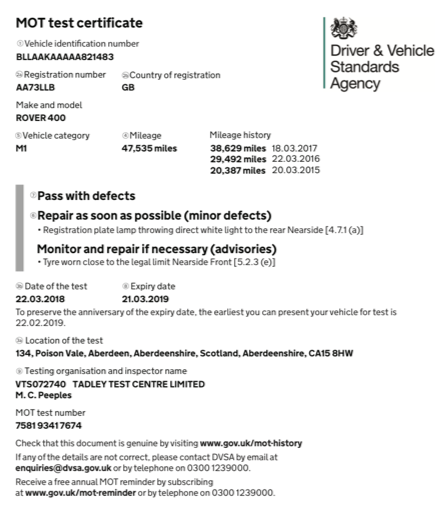On May 20th 2018, the MOT test changed across England, Scotland and Wales, as part of the EU roadworthiness directive. This aims to reduce road transport fatalities to zero by 2050 and improve the environment through fully-functioning vehicle emission control systems.
The change affects cars, vans, motorcycles and other light passenger vehicles. Two months later and some people are still unsure of what the changes entail, as our expert insurance manager Micheala recently found out when she gave a talk on the subject. We’ve therefore created this guide to ensure you understand the full extent of the changes and what to do should you face a fault.
What New Items Are Included In The MOT?
New checks include:
- If tyres are underinflated.
- If the brake fluid has been contaminated.
- Fluid leaks that could be an environmental risk.
- That brake pad warning lights are working and if brake pads or discs are missing.
- Reversing lights on vehicles first used from 1st September 2009.
- For those that have them, headlight washers on vehicles first used from 1st September 2009.
- Daytime running lights on vehicles first used from 1st March 2018 (though most of these vehicles will have their first MOT in 2021 when they’re 3 years old).
- Bumper condition and security.
- Rear drive shaft.
Other checks include prop shafts, floor condition and undertray security, as well as noise suppression material and emission control equipment.
The MOT certificate has also changed, now listing defects under the new categories (minor, major, dangerous) making them easier to understand. As you can see below, this vehicle clearly passed with defects, and advice has been given on what the driver should do next.
Don’t worry if you still have an old-style certificate, as they’re still valid until their expiration date and don’t need replacing.

How Are Defects Now Categorised?
Instead of simply giving your vehicle a ‘Pass’ or ‘Fail’, found faults will be categorised as either, ‘Minor’, ‘Major’ or ‘Dangerous’. Though ‘Minor’ faults will usually result in your vehicle receiving an overall ‘Pass’, the latter two won’t.
What Do The New Categories Mean?
Minor: The faults are recorded so that you can get them repaired in your own time. There is no significant threat to vehicle safety or the environment.
Major: The fault should be repaired immediately, though the driver can take the vehicle to another centre or garage to have it fixed. The fault may affect the vehicle’s safety, impact the environment and put other drivers at risk.
Dangerous: The fault must be fixed at the place it was tested, as it poses a hazardous risk to road safety or could have a serious impact on the environment. The vehicle must not be driven until it has been repaired. If a driver did, they could be faced with a £2,500 fine and 3 points on their licence.
The tester will also give advice, known as ‘advisories’ concerning things you need to monitor, and may need to repair in the future.
How Have The Changes Affected Diesel Cars?
If your vehicle has a diesel particulate filter (DPF), you could receive a ‘Major’ fault if the tester can see smoke coming out of your exhaust, or finds evidence that the DPF has been tampered with.
If you’re unsure whether your vehicle has a DPF, we recommend you check your handbook as a new one can cost £1000. Drivers could also be fined £1000 if their diesel vehicle doesn’t have one.
What Other Changes Have Been Introduced?
- Vehicles over 40 years old won’t need an MOT so long as they haven’t been ‘substantially changed’. These changes include alteration of the suspension and steering.
- The online service to check your vehicle’s MOT history has been updated to compliment the changes.
- You can receive a text message or email reminder one month before your next MOT is due. You can sign up for this service here.
For more information on the new MOT, do not hesitate to call us for a detailed and informative chat on 0161 710 304.






